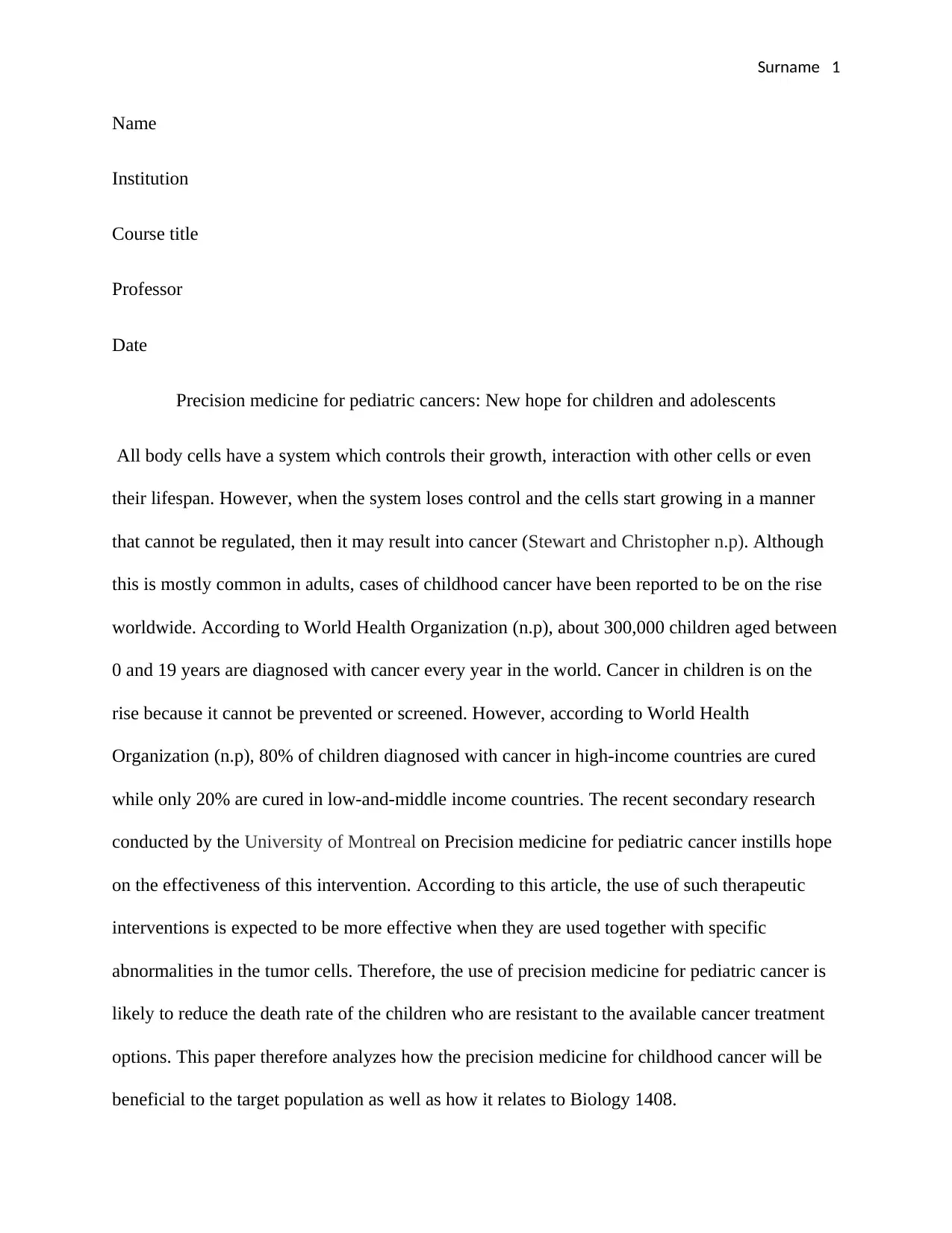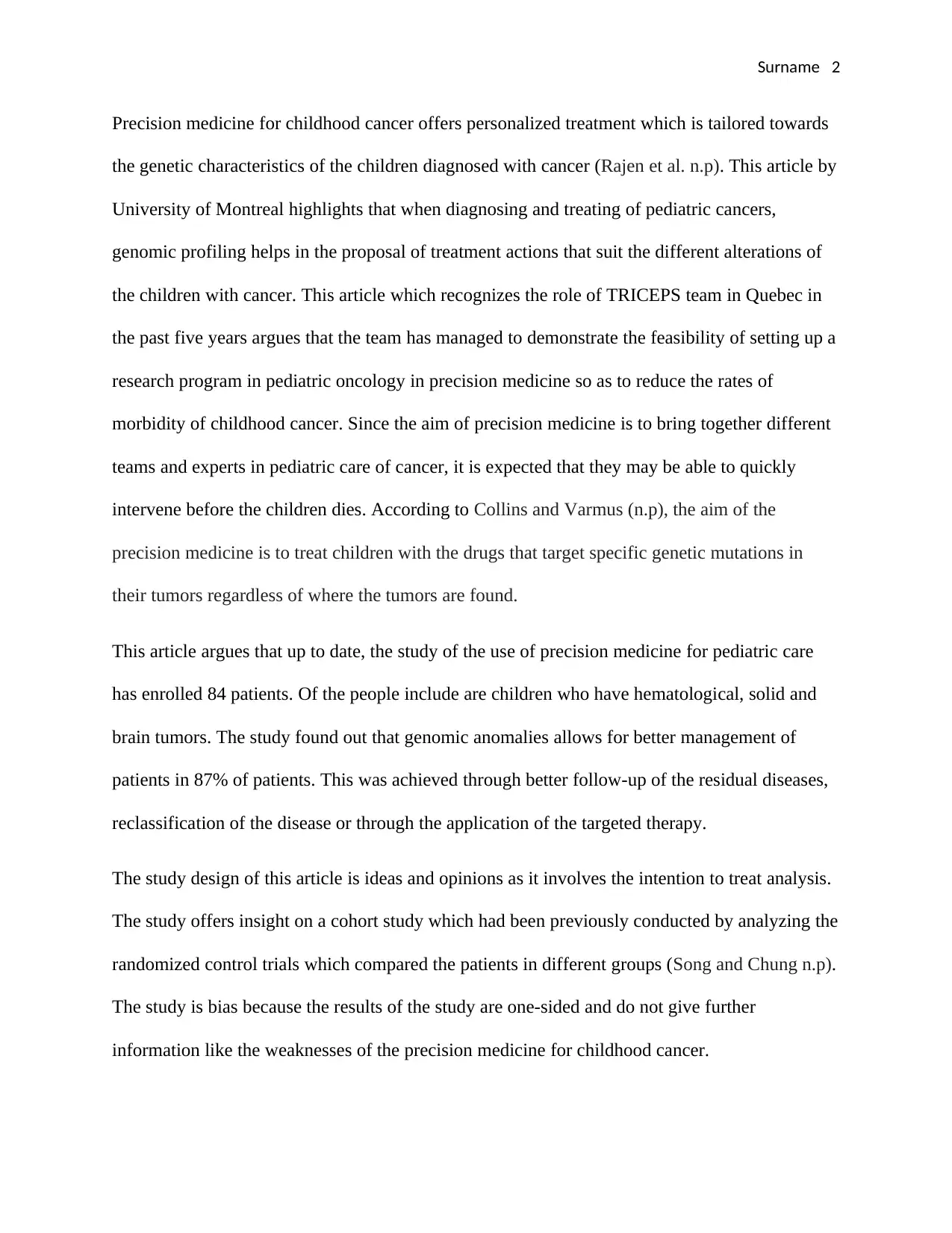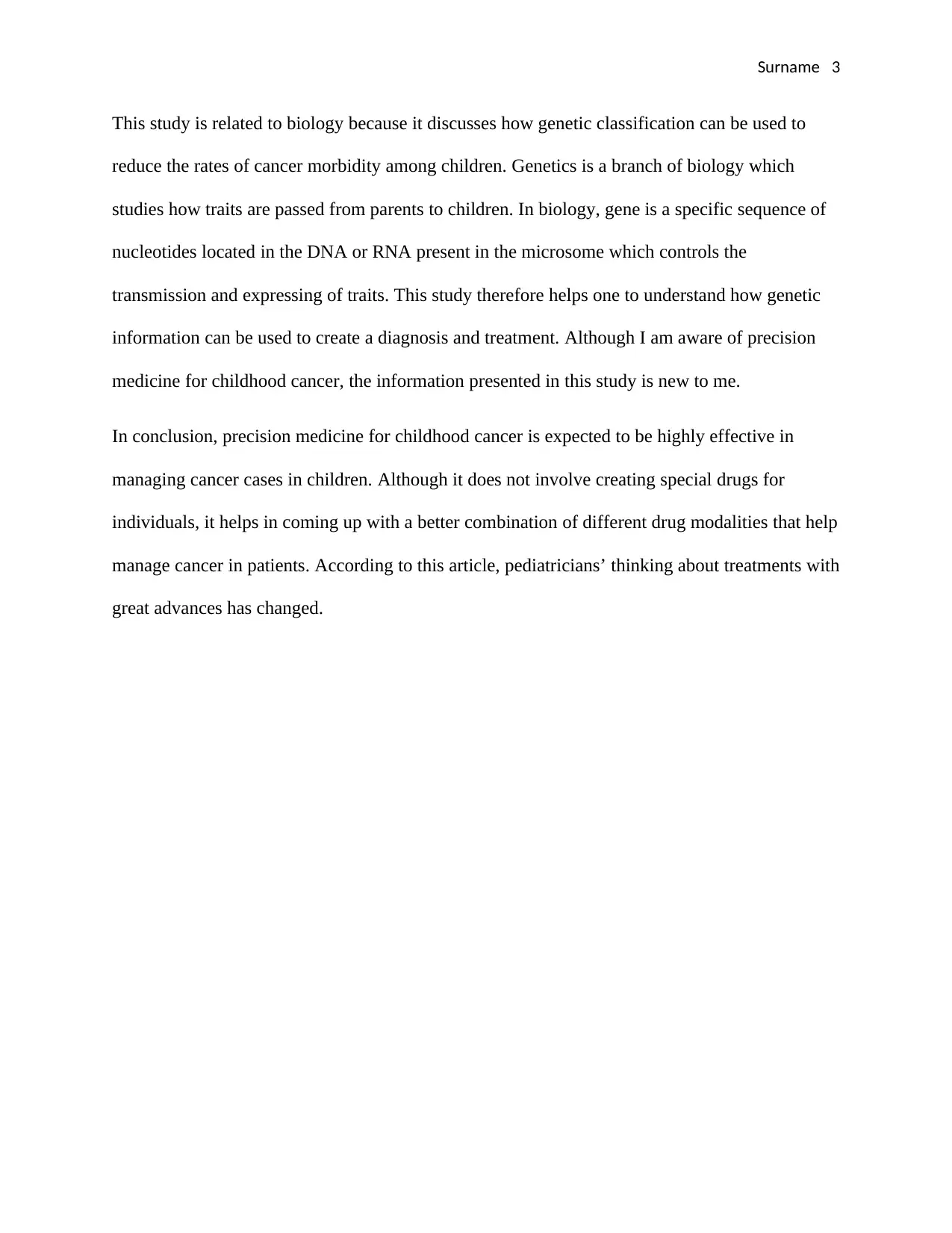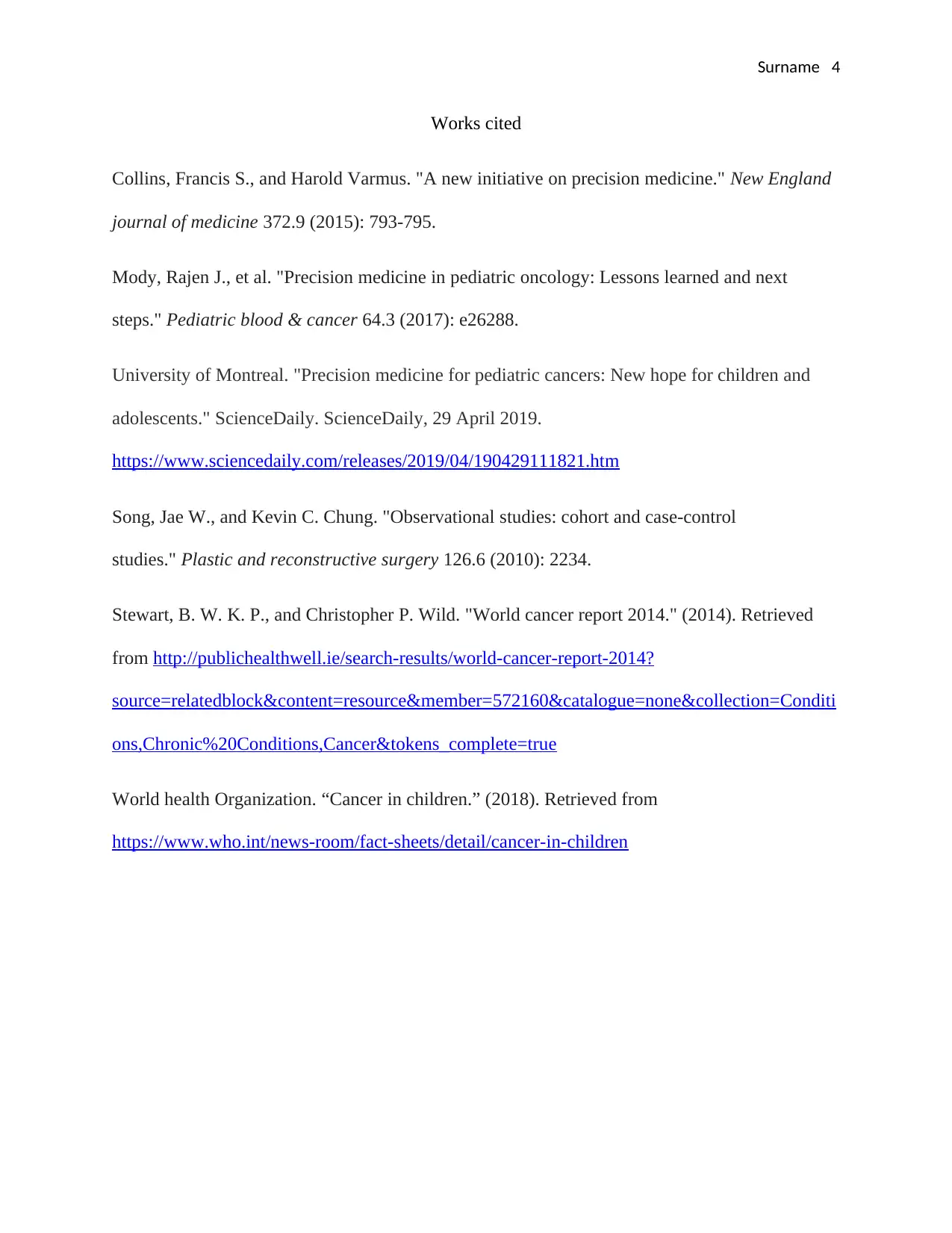Analysis of Precision Medicine for Pediatric Cancers in Biology 1408
VerifiedAdded on 2022/12/21
|4
|1016
|68
Homework Assignment
AI Summary
This paper analyzes a current event related to precision medicine for pediatric cancers, focusing on its relevance to Biology 1408. The assignment examines an article from ScienceDaily, discussing how genomic profiling can improve cancer treatment for children. The author highlights the personalized approach of precision medicine, which tailors treatments to the genetic characteristics of each child's cancer. The study also discusses the use of precision medicine, emphasizing its potential to reduce mortality rates in children resistant to standard cancer treatments. The paper discusses how this research is related to biology, particularly genetics, and its role in understanding and treating diseases. The assignment concludes with a summary of the information presented, reflecting on the potential of precision medicine to change pediatric cancer treatment and the author's increased understanding of the topic.

Surname 1
Name
Institution
Course title
Professor
Date
Precision medicine for pediatric cancers: New hope for children and adolescents
All body cells have a system which controls their growth, interaction with other cells or even
their lifespan. However, when the system loses control and the cells start growing in a manner
that cannot be regulated, then it may result into cancer (Stewart and Christopher n.p). Although
this is mostly common in adults, cases of childhood cancer have been reported to be on the rise
worldwide. According to World Health Organization (n.p), about 300,000 children aged between
0 and 19 years are diagnosed with cancer every year in the world. Cancer in children is on the
rise because it cannot be prevented or screened. However, according to World Health
Organization (n.p), 80% of children diagnosed with cancer in high-income countries are cured
while only 20% are cured in low-and-middle income countries. The recent secondary research
conducted by the University of Montreal on Precision medicine for pediatric cancer instills hope
on the effectiveness of this intervention. According to this article, the use of such therapeutic
interventions is expected to be more effective when they are used together with specific
abnormalities in the tumor cells. Therefore, the use of precision medicine for pediatric cancer is
likely to reduce the death rate of the children who are resistant to the available cancer treatment
options. This paper therefore analyzes how the precision medicine for childhood cancer will be
beneficial to the target population as well as how it relates to Biology 1408.
Name
Institution
Course title
Professor
Date
Precision medicine for pediatric cancers: New hope for children and adolescents
All body cells have a system which controls their growth, interaction with other cells or even
their lifespan. However, when the system loses control and the cells start growing in a manner
that cannot be regulated, then it may result into cancer (Stewart and Christopher n.p). Although
this is mostly common in adults, cases of childhood cancer have been reported to be on the rise
worldwide. According to World Health Organization (n.p), about 300,000 children aged between
0 and 19 years are diagnosed with cancer every year in the world. Cancer in children is on the
rise because it cannot be prevented or screened. However, according to World Health
Organization (n.p), 80% of children diagnosed with cancer in high-income countries are cured
while only 20% are cured in low-and-middle income countries. The recent secondary research
conducted by the University of Montreal on Precision medicine for pediatric cancer instills hope
on the effectiveness of this intervention. According to this article, the use of such therapeutic
interventions is expected to be more effective when they are used together with specific
abnormalities in the tumor cells. Therefore, the use of precision medicine for pediatric cancer is
likely to reduce the death rate of the children who are resistant to the available cancer treatment
options. This paper therefore analyzes how the precision medicine for childhood cancer will be
beneficial to the target population as well as how it relates to Biology 1408.
Paraphrase This Document
Need a fresh take? Get an instant paraphrase of this document with our AI Paraphraser

Surname 2
Precision medicine for childhood cancer offers personalized treatment which is tailored towards
the genetic characteristics of the children diagnosed with cancer (Rajen et al. n.p). This article by
University of Montreal highlights that when diagnosing and treating of pediatric cancers,
genomic profiling helps in the proposal of treatment actions that suit the different alterations of
the children with cancer. This article which recognizes the role of TRICEPS team in Quebec in
the past five years argues that the team has managed to demonstrate the feasibility of setting up a
research program in pediatric oncology in precision medicine so as to reduce the rates of
morbidity of childhood cancer. Since the aim of precision medicine is to bring together different
teams and experts in pediatric care of cancer, it is expected that they may be able to quickly
intervene before the children dies. According to Collins and Varmus (n.p), the aim of the
precision medicine is to treat children with the drugs that target specific genetic mutations in
their tumors regardless of where the tumors are found.
This article argues that up to date, the study of the use of precision medicine for pediatric care
has enrolled 84 patients. Of the people include are children who have hematological, solid and
brain tumors. The study found out that genomic anomalies allows for better management of
patients in 87% of patients. This was achieved through better follow-up of the residual diseases,
reclassification of the disease or through the application of the targeted therapy.
The study design of this article is ideas and opinions as it involves the intention to treat analysis.
The study offers insight on a cohort study which had been previously conducted by analyzing the
randomized control trials which compared the patients in different groups (Song and Chung n.p).
The study is bias because the results of the study are one-sided and do not give further
information like the weaknesses of the precision medicine for childhood cancer.
Precision medicine for childhood cancer offers personalized treatment which is tailored towards
the genetic characteristics of the children diagnosed with cancer (Rajen et al. n.p). This article by
University of Montreal highlights that when diagnosing and treating of pediatric cancers,
genomic profiling helps in the proposal of treatment actions that suit the different alterations of
the children with cancer. This article which recognizes the role of TRICEPS team in Quebec in
the past five years argues that the team has managed to demonstrate the feasibility of setting up a
research program in pediatric oncology in precision medicine so as to reduce the rates of
morbidity of childhood cancer. Since the aim of precision medicine is to bring together different
teams and experts in pediatric care of cancer, it is expected that they may be able to quickly
intervene before the children dies. According to Collins and Varmus (n.p), the aim of the
precision medicine is to treat children with the drugs that target specific genetic mutations in
their tumors regardless of where the tumors are found.
This article argues that up to date, the study of the use of precision medicine for pediatric care
has enrolled 84 patients. Of the people include are children who have hematological, solid and
brain tumors. The study found out that genomic anomalies allows for better management of
patients in 87% of patients. This was achieved through better follow-up of the residual diseases,
reclassification of the disease or through the application of the targeted therapy.
The study design of this article is ideas and opinions as it involves the intention to treat analysis.
The study offers insight on a cohort study which had been previously conducted by analyzing the
randomized control trials which compared the patients in different groups (Song and Chung n.p).
The study is bias because the results of the study are one-sided and do not give further
information like the weaknesses of the precision medicine for childhood cancer.

Surname 3
This study is related to biology because it discusses how genetic classification can be used to
reduce the rates of cancer morbidity among children. Genetics is a branch of biology which
studies how traits are passed from parents to children. In biology, gene is a specific sequence of
nucleotides located in the DNA or RNA present in the microsome which controls the
transmission and expressing of traits. This study therefore helps one to understand how genetic
information can be used to create a diagnosis and treatment. Although I am aware of precision
medicine for childhood cancer, the information presented in this study is new to me.
In conclusion, precision medicine for childhood cancer is expected to be highly effective in
managing cancer cases in children. Although it does not involve creating special drugs for
individuals, it helps in coming up with a better combination of different drug modalities that help
manage cancer in patients. According to this article, pediatricians’ thinking about treatments with
great advances has changed.
This study is related to biology because it discusses how genetic classification can be used to
reduce the rates of cancer morbidity among children. Genetics is a branch of biology which
studies how traits are passed from parents to children. In biology, gene is a specific sequence of
nucleotides located in the DNA or RNA present in the microsome which controls the
transmission and expressing of traits. This study therefore helps one to understand how genetic
information can be used to create a diagnosis and treatment. Although I am aware of precision
medicine for childhood cancer, the information presented in this study is new to me.
In conclusion, precision medicine for childhood cancer is expected to be highly effective in
managing cancer cases in children. Although it does not involve creating special drugs for
individuals, it helps in coming up with a better combination of different drug modalities that help
manage cancer in patients. According to this article, pediatricians’ thinking about treatments with
great advances has changed.
⊘ This is a preview!⊘
Do you want full access?
Subscribe today to unlock all pages.

Trusted by 1+ million students worldwide

Surname 4
Works cited
Collins, Francis S., and Harold Varmus. "A new initiative on precision medicine." New England
journal of medicine 372.9 (2015): 793-795.
Mody, Rajen J., et al. "Precision medicine in pediatric oncology: Lessons learned and next
steps." Pediatric blood & cancer 64.3 (2017): e26288.
University of Montreal. "Precision medicine for pediatric cancers: New hope for children and
adolescents." ScienceDaily. ScienceDaily, 29 April 2019.
https://www.sciencedaily.com/releases/2019/04/190429111821.htm
Song, Jae W., and Kevin C. Chung. "Observational studies: cohort and case-control
studies." Plastic and reconstructive surgery 126.6 (2010): 2234.
Stewart, B. W. K. P., and Christopher P. Wild. "World cancer report 2014." (2014). Retrieved
from http://publichealthwell.ie/search-results/world-cancer-report-2014?
source=relatedblock&content=resource&member=572160&catalogue=none&collection=Conditi
ons,Chronic%20Conditions,Cancer&tokens_complete=true
World health Organization. “Cancer in children.” (2018). Retrieved from
https://www.who.int/news-room/fact-sheets/detail/cancer-in-children
Works cited
Collins, Francis S., and Harold Varmus. "A new initiative on precision medicine." New England
journal of medicine 372.9 (2015): 793-795.
Mody, Rajen J., et al. "Precision medicine in pediatric oncology: Lessons learned and next
steps." Pediatric blood & cancer 64.3 (2017): e26288.
University of Montreal. "Precision medicine for pediatric cancers: New hope for children and
adolescents." ScienceDaily. ScienceDaily, 29 April 2019.
https://www.sciencedaily.com/releases/2019/04/190429111821.htm
Song, Jae W., and Kevin C. Chung. "Observational studies: cohort and case-control
studies." Plastic and reconstructive surgery 126.6 (2010): 2234.
Stewart, B. W. K. P., and Christopher P. Wild. "World cancer report 2014." (2014). Retrieved
from http://publichealthwell.ie/search-results/world-cancer-report-2014?
source=relatedblock&content=resource&member=572160&catalogue=none&collection=Conditi
ons,Chronic%20Conditions,Cancer&tokens_complete=true
World health Organization. “Cancer in children.” (2018). Retrieved from
https://www.who.int/news-room/fact-sheets/detail/cancer-in-children
1 out of 4
Your All-in-One AI-Powered Toolkit for Academic Success.
+13062052269
info@desklib.com
Available 24*7 on WhatsApp / Email
![[object Object]](/_next/static/media/star-bottom.7253800d.svg)
Unlock your academic potential
Copyright © 2020–2026 A2Z Services. All Rights Reserved. Developed and managed by ZUCOL.